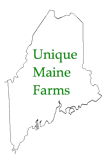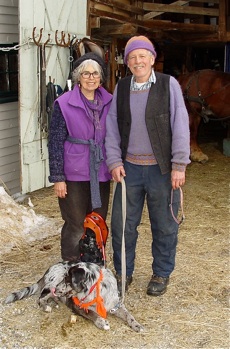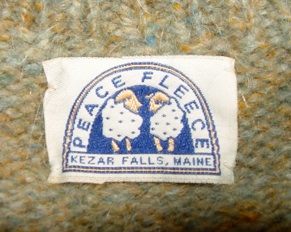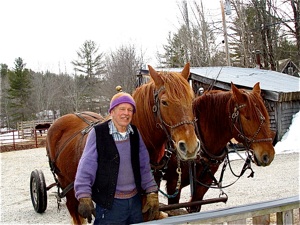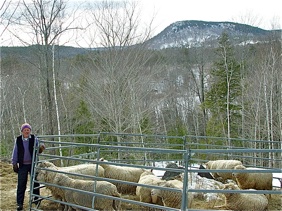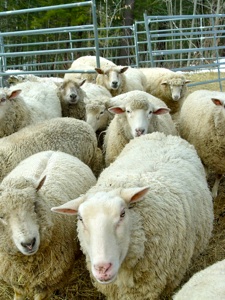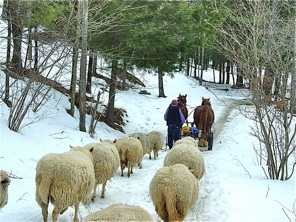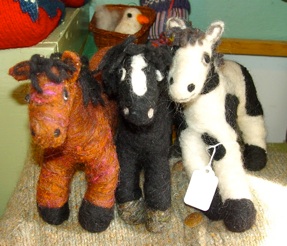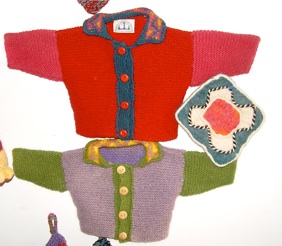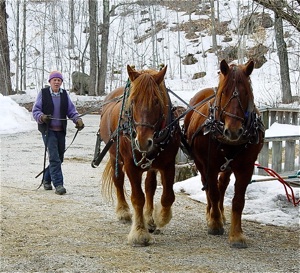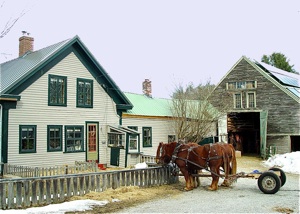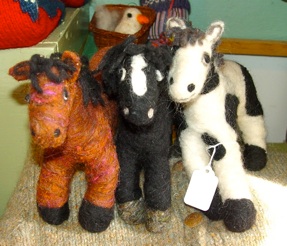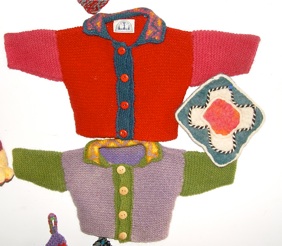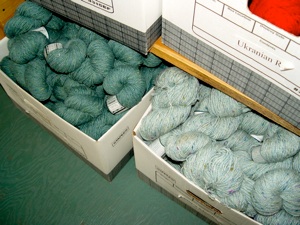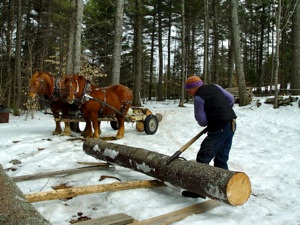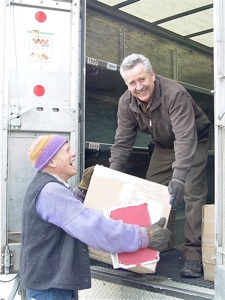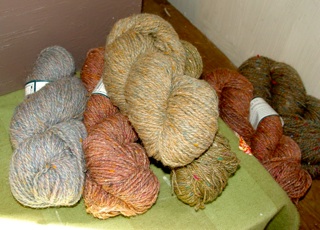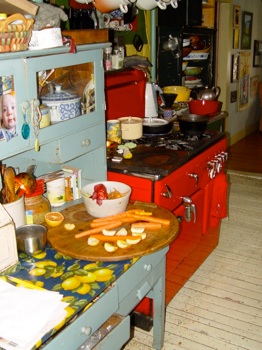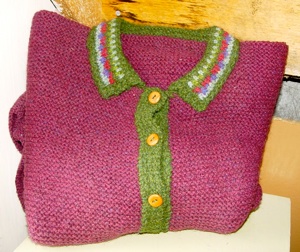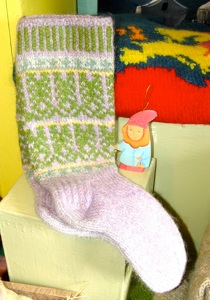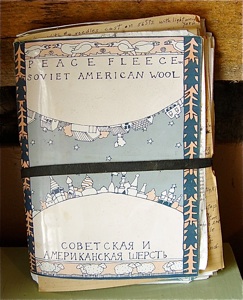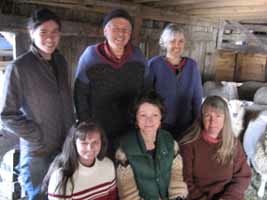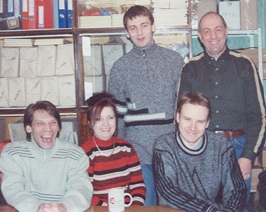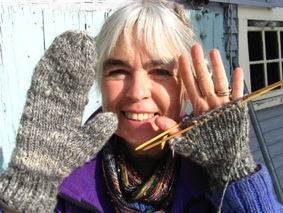Name: Peace Fleece Farm
Address: Peter Hagerty
Marty Tracy
475 Porterfield Road
Porter, Maine 04068
Phone: 207-625-4906
Website: www.peacefleece.com
Email: info@peacefleece.com
Products and Services:
-online shop
-handmade drop spindles
-raw fleeces for hand spinners
-wool/mohair batting for felters/spinners
-Russian hand-painted knitting needles
-knitting and crocheting yarns
-wooden buttons
-assortment of products for various causes
-international peace relations
-Russian Waldorf puzzles
What Makes Peace Fleece Farm Unique?
If you have ever heard the quote by Mahatma Gandhi of “Be the change you wish to see in the world,” then after reading this profile of the Peace Fleece Farm, perhaps you will agree that it seems that Peter Hagerty and Marty Tracy have seemed to genuinely take this message to heart. Their work for peaceful relations on an international level is a powerful testament of how a small Maine family farm can affect positive change in our state, country, and throughout the world.
Over twenty-eight years ago, Peace Fleece was born when Peter Hagerty ventured to the Soviet Union in search of wool with the goal of establishing peaceful relations with a Communist state that was viewed as a nuclear threat. The Cold War was in its prime and the fact that Peace Fleece, a small farm in a rural Maine town with a population of under 1500 people at the time, was reaching out to establish a peaceful relationship with Soviet farmers was a truly courageous and unexpected undertaking.
Peter and Marty moved to their farm in Porter, a rural hamlet of Kezar Falls, in 1974. They both were greatly affected by what was taking place with the Cold War. Marty became involved with the international work camps where European volunteers came to the United States to work on community projects. Peter headed to the Soviet Union to meet other sheep farmers and explore how a peaceful mutually-beneficial economic trade relationship might be able to be established.
In 1985, Peter purchased three bales of Merino wool from Nikolai Borisovitch Emelianov of Exportjlon in Russia. Peter dreamt of bringing the Russian wool back to Maine and blending it with Maine wool and calling it “Peace Fleece.” His dream became a reality and he and Marty have developed a highly-respected and successful fiber enterprise that has provided local employment opportunities for several area residents.
If you have the interest in learning about the many challenges that were involved in bringing the Russian wool to Maine with the initial transaction, it is recommended that you check out the “Timeline” entry on Peace Fleece’s website: www.peacefleece.com Suffice it to say, Peter faced one challenge after another ensuring that the wool would actually be shipped, reasonably taxed, and willingly unloaded in Boston.
Peter returned to Moscow the following year in 1986, and was able to purchase enough Russian wool to meet the demand for four years. He helped to arrange for wool from Texas to be sold to Exportljon in Moscow. These interactions were monumental because they were the true beginnings of trade between the United States and the Soviet Union.
The coverage that Peace Fleece Farm received for their international efforts was quite spectacular. They were featured on the cover of two issues of
the Wall Street Journal. There was an article in People magazine. The BBC and CBS both sent crews to cover the story. Their profile on the “Today Show” brought an enormous response.
Despite all the media attention over the years, Peter and Marty have always remain grounded.
They raise sheep and work with the draft horses in the woods and fields. Peter volunteered to help found MOFGA’s Low Impact Forestry group. Marty and Peter tend large gardens, preserve their food, and make maple syrup. Over the years they have volunteered with Scouts, and school and community activities. Peter helps out at the Common Ground Fair every year. Marty, a potter, artist, and an accomplished fiber artisan has volunteered to run a Farm Art program for young girls in the summer. She also serves on the Conservation Commission in Porter.
In 1988, the next destinations in Peter and Marty’s quest for wool were Moldova , the Ukraine, and Uzbekistan. Unfortunately, no appropriate source of wool turned up during that overseas trip. Peace Fleece turned to the Texas fine wool of Don Forte for their supply that year. Peter ended up in Siberia and Kazakhstan the following year. His meeting with Afghan soldiers brought back some painful memories of his time in Vietnam.
In 1989, Peter and Marty traveled with their two children, Cora Josephine and Silas, to Russia to spend some time with their business partners, Vica and Igor Butenko. During their two-week stay, they enjoyed visiting the after-school craft program that Vica and Igor conducted. The students in the program had hand painted knitting needles and Peace Fleece Farm was thrilled to begin selling these colorful needles. They have remained a very popular item in their online catalog sales.
The following year in 1990, Peace Fleece brought the Wednesday Spinners from Maine to Moscow. The Wednesday Spinners is a group of spinners from Downeast Maine who have been meeting regularly in the home of a different spinner each Wednesday, from September through May for over thirty-five years. When the Wednesday Spinners visited Moscow in 1990, they taught high school students in Moscow how to work with wool.
During that 1990 trip to Russia, Peter and Marty were invited to stay with Luba and Sasha Reotov and their children, Anna and Sergei, at their home in Moscow. This was the beginning of a beautiful friendship and business partnership that has flourished for over twenty-four years. That same year, Sergei, the son of Luba and Sasha, and nine other students, came to Maine with their traditional Russian crafts and sold them at the Common Ground Fair.
As the years passed, Peace Fleece’s relations with purchasing wool from Russia continued to develop. Russian wool and hand-made knitted crafts have been marketed successfully for quite some time. The sale of handpainted wooden knitting needles and handpainted wooden buttons is strong. Since 2008, Luba has made many wonderful felted creations that Peace Fleece sells. At the present time, a staff of Russian wool associates composed of Ivan, Oleg, Dima, Marina, and Kostia conduct Peace Fleece business in Yaroslavl, Russia.
In 1991, in response to the first Gulf War, Peter and Marty traveled to the Middle East to find Arab and Israeli shepherds who would be willing to blend their wool together for Peace Fleece. They discovered Neve Shalom/Wahat at Salaam, which was a community of Palestinians and Jews who were living together. They were befriended by Abu Abed who invited them for lunch in his Bedouin tent. Abu had a large flock of Avassi sheep.
Peter and his family and a group of spinners and weavers returned to Neve Shalom/Wahat al Salaam in 1993, to oversee the Peace Fleece Sheep and Wool Festival. The wool from Abu Abed’s sheep was sheared and washed and flown back home where it was blended with the fleece of Maine island wool. This was the first rug yarn that Peace Fleece had spun.
In 1993, Peter began working in Kazahstan with the All Union Sheep Breeders group outside of Alma Aty. He then traveled to Kyrgyzstan where he lived in a yurt and visited with shepherds in the mountains. As Peter explained, “We washed freshly-shorn merino fleece in glacial runoff water heated with burning cow and sheep dung. We baled this wool and loaded it onto the first Lufthansa flight ever to visit Kyrgyzstan. We saw Kyrgyz women beating wool with long metal whips to make thick, colorfully-designed walls for their yurts.”
In 1994, Peace Fleece started a sheep health project with Land O’ Lakes working with Palestinian and Israeli farmers, veterinarians,
and academics to eradicate anthrax, brucellosis, and hoof and mouth disease. Peace Fleece and Land O’ Lakes worked together the following year to create the Moscow Area Sheep Association where a lamb and wool correspondence course was translated into Russian.
Peace Fleece was asked in 1994, by Zacharia, a community activist, to provide veterinarian services and working medicines in Beit Sera, a small Palestinian village. Peace Fleece agreed to fund the Woman’s Sheep and Goat Project through the sale of certain yarns.
One of the next projects with which Peace Fleece
became involved was Rainbow Socks. It centered around the encouragement of the activity of knitting among Bosnian women living in refugee camps to help them with the trauma caused by the witness of genocide during the Balkan War. Peace Fleece helped to send over 60,000 pounds of yarn and 600 pounds of knitting needles to the women in Croatia.
In 1996, Peace Fleeece worked with the Korneva family in the Istra Region of Russia. They began selling the handknit socks of Ludmilla’s mother.
The following year, Peace Fleece purchased a small flock of black and white Romanov sheep from Pavel and Galina Potstrelov in Russia with the understanding that they would be cared for on Fydor Krut’s farm. Fydor agreed to keep the lambs and it was decided that the wool would be sent to Kazakhastan where it would be made into felted baby booties called valienki.
In 1998, Peace Fleece purchased fine wool and mohair from Texas. The Moore family in Ohio, with their 2000 Merino sheep, became the principal supplier of domestic wool for Peace Fleece in 2000. Thanks to the efforts of Simon Neylon from Australia in 2001, Peter was able to procure a supply of Open Top Merino wool from Romania.
The Sheep Adoption Project was begun in 2002, when Peace Fleece and a group of Washington State farmers visited Pavel and Galina’s farm in Russia which was facing critical times since Pavel was stricken with leukemia. The American farmers agreed to purchase several of the ewes with the expectation that the ewes would remain on the farm. Sadly, Pavel passed away in 2005..
In 2004, Peter and Marty were able to visit the Lacu Sarat Farm, a large operation with 900 Merino sheep in southeastern Romania. While they were visiting Russia the horrendous Beslan crisis unfolded. For a family so focused on peace, it was certainly a most upsetting time.
Since Peter and Marty had raised and worked horses at their farm for years, they were well aware of how horses could prove very effective in dealing with youth who were facing various challenges. Peace Fleece helped to initiate the Russian-American Horse Healing Project where children from the Pyatyorka Orphanage were given the opportunity to help groom or walk or ride a horse.
Peter and Marty traveled to Russia in 2007, to attend the Russian-American Horse Training Workshop. The goal of the project was to introduce horses to children so that they would have the opportunity to develop a sense of responsibility and strengthen their character and self-esteem. Horse trainers, riders, and social workers volunteered to come together to see how horses could benefit the orphans.
In 2010, Peace Fleece visited with Leonard and Estelle Cook and their son Lenny, and daughter Carol, who ranch about 15,000 acres on the Cheyenne River Reservation in South Dakota. They purchased their Rambuiolett wool clip from the Cook Farm for the Peace Fleece blend.
Peter and Marty hosted Doctor Khassan Baiev, a Chechen plastic surgeon, who wrote Grief of My Heart in 2011. He shared a movie about his work in the Caucaus Mountain Republic. Dr. Baiev treated soldiers on both sides of the conflict and has been recognized for his humanitarian work.
At the 2012 Common Ground Fair, Peter spoke about how he was invited by the Black Mesa Water Coalition, a group of Navajos in Northeast Arizona, to visit with some native sheep ranchers, Peace Fleece formed a partnership with the ranchers. The project is called the Black Mesa Wool Project. The goal is to support the pastoral way of life of the ranchers by sharing information on improving grazing patterns and soil fertility.
Peter and Marty’s fervent interest in world peace
and humanitarian causes at home and throughout the world has never wavered. There is not room to include all the causes that they have supported over the years. It appears that their commitment to social justice has influenced their children. Their son, Silas, a filmmaker, spent several years volunteering his time and talent to the production of Dakota 38, a movie that promotes healing and reconciliation for Native Americans. Their daughter, Cora Josephine, was involved with Project Reel in Los Angeles, where five new filmmakers came together to make short films to inspire and uplift.
On the Peace Fleece’s website Peter Hagerty is
quoted as saying that to him, “agriculture is a medium to bring people closer together.” Peter and Marty are stellar examples of how ordinary people can play a role in extraordinary accomplishments. They were never asked to
function in the role of ambassadors, but by
opening doors between countries that historically have closed their doors, they have proven that
differences can be overcome and change can result. They truly have lived Gandhi’s message of “being the change you wish to see.” Because of their persistence, positive attitude, and open-mindedness, people all over the world have learned about a small sheep and horse farm in the foothills of Porter, Maine, that has been involved with some mighty big happenings.


